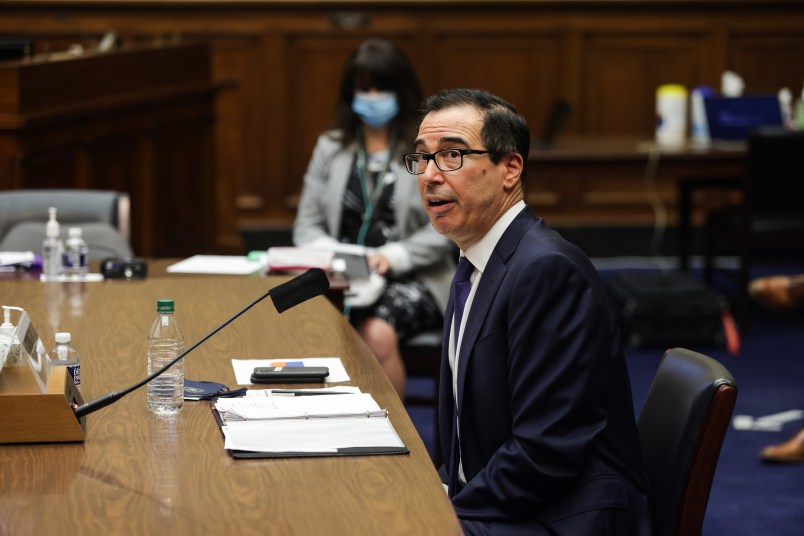In between trumpeting that the economy is “recovering very strongly” and that the jobs market is “strengthening,” Treasury Secretary Steve Mnuchin admitted that “certain areas” of the economy need more help — but offered little in the way of concessions that would restart negotiations on legislation to address the problem.
He opened his testimony before the House Select Subcommittee on the Coronavirus Tuesday by touting “increases in jobs, retail sales, business activities and home sales,” making the argument that the economy is making a strong and rapid comeback under the Trump administration.
“This is not like a normal economic crisis,” he said, claiming that the still-dismal, but not-as-dismal-as-a-few-months-ago joblessness numbers are a sign of major recovery.
He admitted that there are certain industries and sectors of the economy that need further relief, and said that he was “prepared to sit down with the Speaker at any time to negotiate.” During an exchange with Rep. Maxine Waters (D-CA), he promised to call House Speaker Nancy Pelosi (D-CA) as soon as the hearing concluded.
“Can I tell her you suggested I call her right after the hearing?” Mnuchin asked.
“Yes, yes, yes,” Waters responded enthusiastically.
“Done, I will call her right after the hearing,” Mnuchin said.
But despite his protestations that he was ready and willing to restart the broken-down negotiations, he offered no concessions that would constitute a good-faith effort to restart the deal-making.
Mnuchin, like White House chief of staff Mark Meadows, seems to have shifted into campaign mode when it comes to the COVID-19 relief negotiations that fell apart last month. Meadows too has been touting the administration’s work, and painting the situation as one where Pelosi is the main obstacle to the two sides coming together on relief like extending the unemployment insurance benefit, or restarting the Paycheck Protection Program.
In reality, the two sides are billions and billions of dollars apart on almost every facet of a relief plan, even if they agree amorphously that there needs to be some aid delivered. Democrats have also been unmoveable on their desire for an expansive relief package, like the $3.4 trillion HEROES Act passed by the House in May.
Senate Republicans have not been able to coalesce behind much of anything, leaving the White House negotiators to offer standalone legislation on certain planks of relief. Pelosi and Schumer have refused to play ball, fearful that Meadows and Mnuchin will walk off the court after getting a couple things done they can tout as administrative accomplishments while leaving other problems unaddressed.
Democrats have offered to come down from their HEROES Act a full $1.2 trillion to be more palatable to Republicans, a concession that was flat-out denied by Meadows during a 25-minute call with Pelosi a few days ago, the most the negotiators have spoken in weeks.
“I do not support $2.2 trillion,” Mnuchin said at the hearing. “But what is more important is what is the breakdown of getting money to American workers, American families, kids,” he said, adding that “there are tremendous areas of agreement and that’s what we should be doing right away.” He named the PPP specifically as something to target that has bipartisan support.
The same committee that Mnuchin testified before released a report today on the very topic on which he’s so eager to find common ground: upon analysis of the PPP, the committee found that “a lack of oversight and accountability from SBA and Treasury may have led to billions of dollars being diverted to fraud, waste, and abuse, rather than reaching small businesses truly in need,” said Chairman Jim Clyburn (D-SC).



